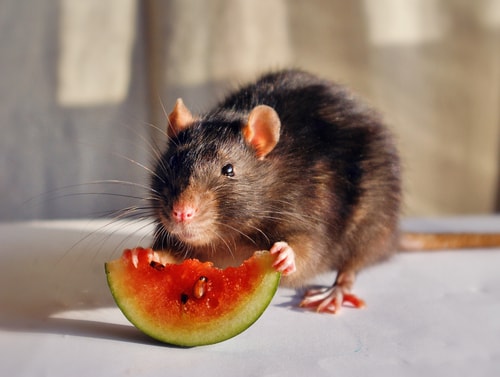
Rats are very picky eaters, but they’re open to meal diversity if their preferred foods aren’t readily available. When pressed, these omnivores will pretty much chow down on whatever they can get their forepaws on, including trash, compost and pet food. They’ll even eat their own fecal matter, though it’s not going to be first on their list.
To better understand these rodents — and figure out what attracts rats to a home — it helps to take a look at their eating habits.
WHAT DO RATS LIKE TO EAT?
While rats are opportunistic feeders that won’t turn their noses up at a free meal, they do have preferences. So, specifically, what do rats eat? In the wild, they’ll often feed on grains, seeds, nuts, fruits and vegetables. They might also eat smaller animals or insects, though this may be less common because it calls for hunting.
WHAT ATTRACTS RATS TO YOUR YARD?
Rats, like most animals, are after three things: food, water and shelter. Think about this and take a good look at your yard. Stacks of bricks or firewood and piles of debris can give rats the shelter they need. When it comes to water, they can quench their thirsts from leaky faucets, storm water drains, birdbaths and even pet bowls.
But what do rats eat in your yard? Probably a lot more than you think. In addition to seeds and grains, rats can make meals out of garbage, pet food, fallen fruit or nuts, vegetable gardens (even after they’ve gone to seed) and compost heaps.
WHAT ATTRACTS RATS TO A HOME?
If rats have trouble locating a food source outdoors, they may venture inside your home to see what sort of buffet you’re offering. This is especially true in colder months, when their natural food sources have dried up and they need shelter from the elements.
What do rats eat in your home? Rats might eat anything people munch on, so there are numerous items that could attract these rodents to your house. Attractive foods can include cereal, oats, rice and vegetables that are stored in cardboard or flimsy plastic, as well as pet food kept in its original packaging. They’ll also rummage through unsealed garbage cans, and can be attracted to oils and other fats that may not have been thoroughly cleaned from countertops, floors or appliances.
HOW TO HELP GET RID OF RATS
It can be very difficult for homeowners to get rid of rats on their own, though you can clean house and set snap traps. Because of this, your best bet is to work with a company that specializes in rodent control services and knows how to help get rid of rats. A trained technician can inspect your home to see what may be attracting rats to your house, and can set up a custom plan to help you prevent and control these animals.


